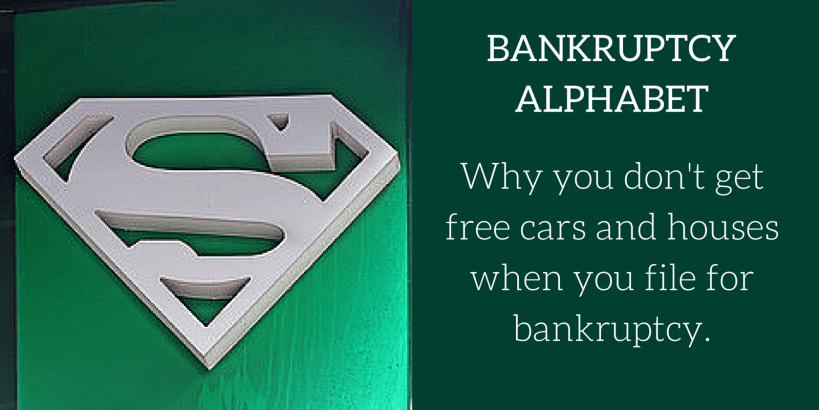Ask most people what they want in life, and they’ll tell you they yearn for security. In the world of bankruptcy, everyone wants that as well. Let’s dig into the next letter of our bankruptcy alphabet.
When you buy a house or a car, you may take a loan against it. That loan typically comes with an agreement that gives the creditor a right to repossess the property if you fail to make payments. That agreement is called a security agreement, and it gives the lender a security interest.
A security interest is a property interest over an asset to secure the performance of your obligation to pay a debt. If you fail to make payment, the holder of the security interest gets first crack at the property and can sell it to get paid.
Security Interests In Bankruptcy
When you file for bankruptcy, the debt you owe to the holder of the security interest gets first priority over everyone else. If property that is not exempt is going to be sold in a Chapter 7 bankruptcy then the money goes to holders of security interests before anyone else.
In Chapter 13 bankruptcy, the story is much the same. But because Chapter 13 involves a reorganization of your finances rather than a discharge of debts, it is the Plan payment that gets allocated first to any arrears due on a secured debt before anyone else gets paid.
Turned Secured Debt Into Unsecured Debt
In a Chapter 13 case we have an opportunity to turn a secured debt into an unsecured one through lien stripping. We talked about lien stripping earlier in the bankruptcy alphabet, so you’re going to want to take a few minutes to review that article now.
Go ahead, I’m patient and will wait.
Back now? OK, good.
Proving A Security Interest
In order to be able to claim a security interest in bankruptcy, the creditor needs to file a Proof of Claim. That Proof of Claim needs to show why you owe money and, if secured status is asserted by the creditor, then proof of that status.
A security interest is typically granted by a security agreement, which is signed by you and the lender, outlining the debt as well as the property held as security. The creditor needs to take certain steps under state law to do what’s called “perfect the interest.” That means exactly what it sounds like – the creditor’s got to make sure it’s perfect.
When you’re dealing with a motor vehicle, the security interest will usually be noted on the title. For real estate, the mortgage is recorded with the county in which the property is located.
If we’re talking about a mortgage, the transfer of the Note is good enough to serve as a transfer of the mortgage. The Note needs to be properly assigned, however, by an entity that has the right to assign it. That’s the crux of much of the mortgage litigation that’s going on around the country, so you want to be aware of it if you’ve got a mortgage and are headed to bankruptcy.
Your Obligation After Bankruptcy
This is where lots of my clients get confused. After your bankruptcy discharge is issued, you have no personal liability to repay the debt (unless you’ve reaffirmed the debt). That having been said, however, the security agreement remains in full force. If you fail to pay, the lender can still repossess or foreclose.
You won’t be held liable for any deficiency, but you also won’t have the car or real estate. So if you want to keep it, make your payments.
Image credit: Leo Reynolds
